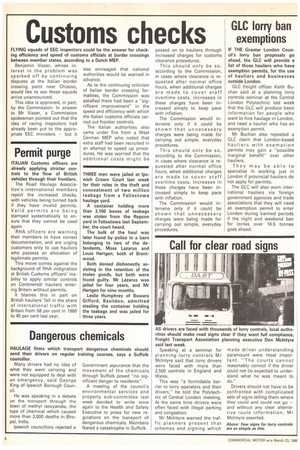Customs checks
Page 8

If you've noticed an error in this article please click here to report it so we can fix it.
FLYING squads of EEC inspectors could be the answer for checking efficiency and speed of customs officials at border crossings between member states, according to a Dutch MEP.
Benjamin Visser, whose interest in the problem was sparked off by continuing disputes at the Italian border crossing point near Chiasso, would like to see these squads arrive unannounced.
This idea is approved, in part, by the Commission. In answer to Mr Visser, a Commission spokesman pointed out that the idea of racing inspectors had already been put to the appropriate EEC ministers — but it was envisaged that national authorities would be warned in advance.
As to the continuing criticism of Italian border crossing formalities, the Commission was satisfied there had been a "significant improvement" in the speed and efficiency with which the Italian customs officials carried out frontier controls.
The Italian authorities also came under fire from a West German MEP who noted that extra staff had been recruited in an attempt to speed up procedures. He was worried that the additional costs might be passed on to hauliers through increased charges for customs clearance procedures.
This should only be so, according to the Commission, in cases where clearance is requested after normal office hours, when additional charges are made to cover staff overtime costs. Increases in these charges have been increased simply to keep pace with inflation.
The Commission would intervene only if it could be shown that unnecessary charges were being made for carrying out simple, everyday procedures.
This should only be so, according to the Commission, in cases where clearance is requested after normal office hours, when additional charges are made to cover staff overtime costs. Increases in these charges have been increased simply to keep pace with inflation.
The Commission would intervene only if it could be shown that unnecessary charges were being made for carrying out simple, everyday procedures.
























































































